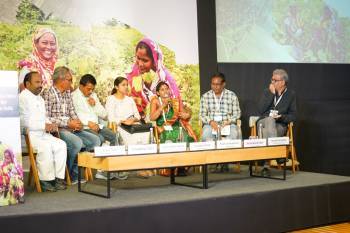NEW DELHI, 15 October 2023: In an endeavor to rejuvenate Indian agriculture, IDH and Better Cotton collaborated to organize 'Agriclimate Nexus: Food, Fibre, and Regeneration for Sustainable Growth in India.' This multi-stakeholder event, featuring representatives from farming communities, the private sector, government, civil society, and beyond, delved into the benefits and opportunities of regenerative agriculture.
Agriculture in India: A Vital Sector at Risk
With over 46% of the population engaged in agriculture, including 86% smallholder farmers, this sector is pivotal to India's economy and society. However, it faces severe challenges, including environmental degradation, soil depletion, and water scarcity, jeopardizing its long-term sustainability. As India's population continues to grow, ensuring food security and livelihoods for millions is imperative.
Regenerative Agriculture: A Sustainable Solution
Regenerative agriculture emerges as a sustainable solution by revitalizing soil health, preserving water resources, and promoting biodiversity, all while enhancing productivity and resilience to climate change.
Uniting Stakeholders for a Regenerative Future
The event served as a collaborative platform for participants from diverse backgrounds, including farming communities, the private sector, civil society, and government. Together, they aimed to drive meaningful progress toward a sustainable and regenerative agricultural future that would protect the environment and improve the livelihoods of small farming communities engaged in food and fiber crop production in India.
Addressing Climate Change through Regenerative Agriculture
Discussions at the event underscored the significance of regenerative agriculture in addressing climate change. By sequestering carbon in the soil, preventing soil degradation, mitigating water scarcity, and preserving biodiversity, this approach enhances food security, reduces greenhouse gas emissions, and restores ecosystems.
Overcoming Barriers and Embracing Change
Participants discussed the barriers they face and potential solutions. They emphasized the importance of adopting the Better Cotton Principles and Criteria and promoting a 'Landscape' approach that fosters change within a specific geographic jurisdiction in collaboration with all stakeholders in the region.
Collaborative Action for a Sustainable Future
Pramit Chanda, Global Director Textiles & Manufacturing at IDH, highlighted the need for collective action, stating, "Through this event, we aspire to create a dynamic, multi-sectoral network and mobilize stakeholders toward a more sustainable and regenerative future for agriculture in India."
Strengthening Cross-Commodity Relations
Jyoti Narain Kapoor, Country Director – India, Better Cotton, stressed the significance of scaling regenerative agricultural practices. He emphasized the importance of strengthening cross-commodity relations and aligning organizations committed to supporting this cause.
A Commitment to Change
Regenerative agriculture offers a sustainable solution to India's agricultural challenges. IDH and Better Cotton are committed to accelerating the adoption of regenerative practices, fostering an enabling environment, and contributing to the revitalization of India's agriculture sector.
A Vision for the Future
As the next steps, IDH and Better Cotton pledge to continue engaging in multi-stakeholder dialogues on regenerative agriculture. They will draw participation from stakeholders across the food and fashion industries, government entities, civil society organizations, academia, and the financial sector. A common framework and enabling environment will propel discussions on regenerative agriculture across policy, finance, and industry.
By promoting regenerative agriculture, IDH and Better Cotton aim to secure a sustainable, resilient, and thriving future for Indian agriculture.




















